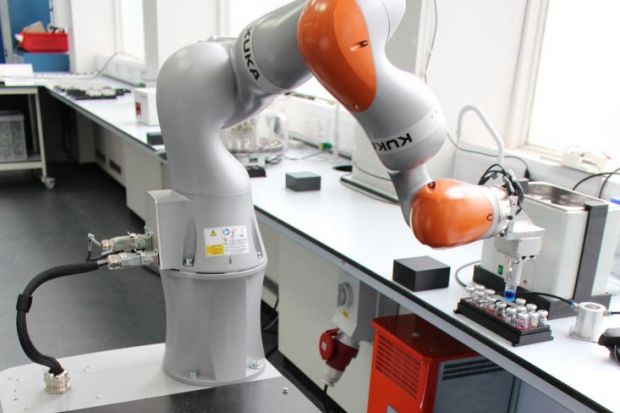Chemists at the University of Liverpool have created a robot scientist that they say can conduct experiments 1,000 times faster than a human researcher.
The robot, which has humanoid dimensions and works in a standard laboratory, uses artificial intelligence to decide which experiments to conduct next and has already discovered a new catalyst.
However, unlike a human, it can work for 21-and-a-half hours a day, pausing only to recharge its battery. This means that it can complete experiments that would take a human several months to complete in just a few days.
Andrew Cooper, director of Liverpool’s Materials Innovation Factory and the leader of the project, said that the robot “creates a level of flexibility that will change both the way we work and the problems we can tackle”.
“This is not just another machine in the lab: it’s a new superpowered team member, and it frees up time for the human researchers to think creatively,” Professor Cooper said.
The robot, described in an article in Nature published on 8 July, uses the same instruments that a human researcher uses, but uses laser scanning and touch feedback for positioning, rather than a vision system.
This means that it can operate in complete darkness, which is an advantage for carrying out light-sensitive photochemical reactions.
In its first published experiment, the robot was programmed to explore various hypotheses to improve the performance of a polymeric photocatalyst. It optimised the reaction conditions within two to three days, instead of the several months that a human would be expected to require.
In total, it conducted 688 experiments across eight days, autonomously discovering a catalyst that is six times more active. To do this it conducted tasks such as weighing out solids, dispensing liquids, removing air from the vessel, running the catalytic reaction, and quantifying the reaction products.
The Liverpool researchers estimate that the robot is able to work 1,000 times faster than a human scientist, and highlight that it is “unlikely a human researcher would have persevered with this multivariate experiment using manual approaches given that it might have taken 50 experiments or 25 days to locate even a modest enhancement”.
While it took two years to develop the robot, once it is operating with a low error rate “it can be used as a routine tool”, the researchers say.
PhD student Benjamin Burger, who built and programmed the robot, said that the biggest challenge “was to make the system robust”.
“To work autonomously over multiple days, making thousands of delicate manipulations, the failure rate for each task needs to be very low. But once this is done, the robot makes far fewer mistakes than a human operator,” he said.
The project was funded by the Leverhulme Trust and the Engineering and Physical Sciences Research Council.
Register to continue
Why register?
- Registration is free and only takes a moment
- Once registered, you can read 3 articles a month
- Sign up for our newsletter
Subscribe
Or subscribe for unlimited access to:
- Unlimited access to news, views, insights & reviews
- Digital editions
- Digital access to THE’s university and college rankings analysis
Already registered or a current subscriber? Login










